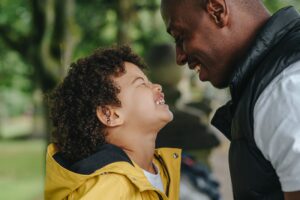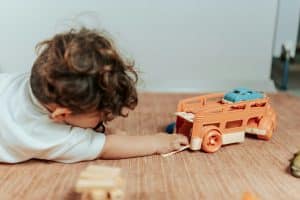Like many parents, you probably watch your baby or toddler and think, “Are they growing and developing the way they should?” The answer is usually yes! However, all kids develop differently. And parents sometimes struggle to know what is typical and what might require extra attention.

One of the biggest thoughts many parents, especially first-time parents, have is wondering if their child is ready for preschool. If your baby has been in childcare from the beginning, you may have fewer questions or concerns about preschool. However, starting preschool is a big deal if your child has been at home with a parent, family member, or nanny!
So, how do parents know if their child is ready for preschool? Here is a brief checklist of things to observe in your child to know if they’re ready!
They Interact with Other Children Well
Yes, children will learn academics in preschool, but preschool is first and foremost about social and emotional development. When children are in a supportive and purposeful learning environment, most will pick up their letters, numbers, colors, shapes, etc. It is the social-emotional piece that truly is fostered in preschool.

For many children, this is their first experience being around multiple peers. They will learn conflict resolution, empathy, waiting their turn, conversation skills, making friends, manners, and more in preschool!
If your child isn’t used to being around other children their age, consider signing them up for a class or playgroup to expose them to peers.
To practice their early academic skills and to play with purpose, check out any of our KneeBouncer games!
They Separate Easily From You
Children with a secure attachment to their parents will have a much easier time starting preschool than those without. A secure attachment doesn’t mean your child never cries when you leave them with the babysitter or gets clingy when it’s time to hang out with Aunt Betty.
But it means that your child can say goodbye to you in most comfortable and sometimes new situations without much tears and fuss.

A secure attachment gives your child the confidence to explore and experience new things. Kids who cry and cling to their parents may actually have the opposite of secure attachment. It’s because they feel insecure that they cling and cry.
You can help your child develop a secure attachment by allowing them to experiment and fail. Secure attachment is achieved through supporting them but not doing it for them. And staying confident and loving in times of discipline and correction.
Additionally, when dropping children off at childcare or leaving them with a babysitter, parents should NEVER “sneak” away while their kids play or sleep to avoid tears. It may avoid tears for parents in the short term, but it causes anxiety for the child. If the child believes mom and dad can disappear whenever they want, they are more likely to feel unstable, anxious, and cling to their parents.
They’re Curious About New People, Places, and Things
If your child loves learning about new things, meeting new people, and is generally curious about their world, it might be time for preschool! Preschool opens up new experiences and access to new people outside their close family and friends.

Curious children will likely be excited to start school because they know it’s where they’ll interact with new toys, people, and materials.
You can build your child’s curiosity by reading to them daily, playing purposefully and interactively with them, and following their interests when playing.
They’re (Mostly) Potty-Trained and Have Other Independent Skills
Kids entering preschool should also be able to get dressed for the most part by themselves, wash their hands, feed themselves, and accomplish other independent tasks.

The potty training debate is considerable, so we won’t delve too far into the issue. However, if your child is primarily potty-trained, meaning the occasional accident here and there, then they are likely ready for preschool.
The average age at which a child can use the toilet independently varies but hovers between 18 and 36 months. Therefore, some kids take longer. And, despite what you may have read online or Sally’s Daycare told you, a child does NOT have to be fully potty-trained by three.
If a preschool tells you your child must be fully potty trained to attend, I recommend looking elsewhere. It is not developmentally appropriate to expect all kids to be fully potty trained by three. If a school ignores this crucial developmental stage, it leaves me wondering what other milestones they’re ignoring.
To learn more about the signs of readiness and potty training, check out this piece from Healthline.
Their Speech is Clear
By the time your child is three years old, others who don’t know your child well should be able to understand most of what they say. If strangers or acquaintances struggle to understand your child, you may want to have them evaluated by their pediatrician or speech therapist.

There are many reasons your child might have a speech delay. For example, there may be issues with their hearing son’s reason), muscle development, learning disabilities, or other cognitive or physical reasons.
A speech delay does not mean they cannot attend press ol. And often, therapists can visit your child’s school and perform therapy in the class or building!
They Can Follow Directions
Following directions is essential in preschool. So, if your little one struggles to follow simple directions, you’ll want to practice first! Give your child simple tasks they can do at home. Try tasks like helping with their laundry, setting the table for dinner, or watering the plants.

Again, preschool is all about learning social rules and developing emotionally, so their teachers aren’t going to expect perfection. In general, your child should be able to follow directions when asked. For example, cleaning toys, lining up to go outside, or washing their hands before eating.
None of the items on this list are make-or-break items. However, if your child is behind in one or more of these areas, you may want to foster these skills at home before signing them up for preschool. Playgroups, dance and sports classes, Sunday School, and part-time preschool are all great options to expose your child to new people and places!
June 23, 2023, by L. Elizabeth Forry








